2026’s Best Organic Sunscreens For Sensitive Skin
Pro Tip: Start with a gentle organic face wash to prep skin for comfortable, irritation-free.
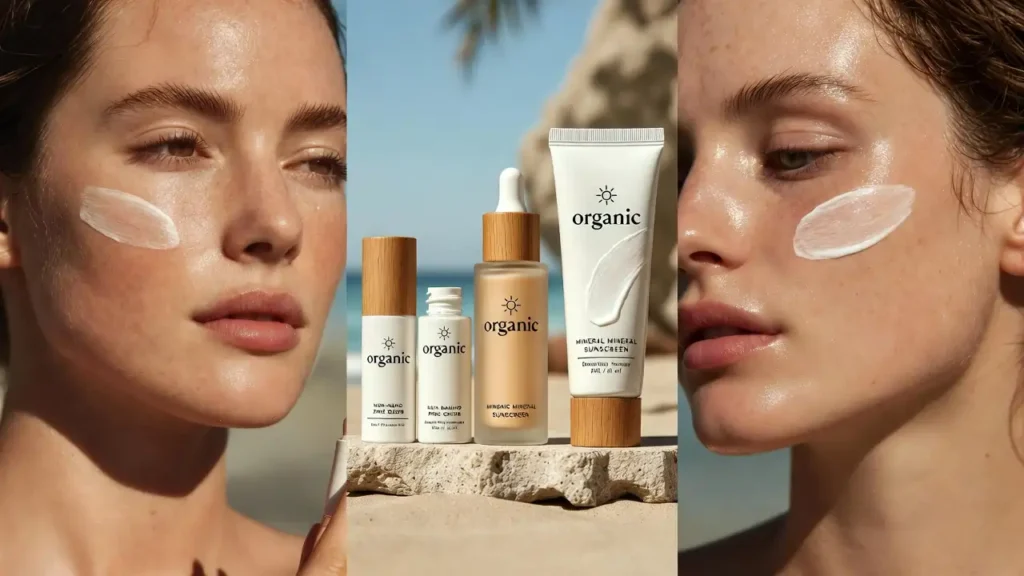
What Is Organic Sunscreen, and Why Does It Matter?
Organic sunscreen is a type of sun protection that utilizes natural ingredients, such as zinc oxide or titanium dioxide, to block UV rays.
Unlike chemical sunscreens, which absorb into the skin and can cause irritation, organic options sit on the skin’s surface and reflect sunlight. This makes them ideal for sensitive skin because they are less likely to trigger redness or breakouts.
For example, EltaMD UV Clear Face Sunscreen SPF 46 is ideal for individuals with eczema or rosacea, as it’s free from harsh additives.
Why Does it Matter to Have Organic Sunscreen?
Organic sunscreen is often formulated without parabens, sulfates, or synthetic fragrances—common irritants that can cause allergic reactions. Plus, many are reef-safe, meaning they don’t harm coral reefs when you swim.
Brands like Thrive use non-nanoparticles that are safer for the environment.
If you have acne-prone skin or dryness, mineral-based formulas won’t clog pores or strip your skin of moisture.
Choosing organic also means supporting cleaner beauty. While it might cost a bit more, the benefits for your skin and the planet are worth it.
Always check labels for broad-spectrum protection to guard against UVA and UVB rays.
Organic vs. Chemical Sunscreens
Organic sunscreens use minerals, such as zinc oxide and titanium dioxide, to physically block UV rays. Unlike chemical sunscreens (which absorb UV), physical sunscreens sit on the skin’s surface and reflect sunlight.
Key benefits:
Less irritation: No oxybenzone or octinoxate, which trigger skin irritation, as proven by assay reactions.
Eco-friendly: Most are reef-safe sunscreens that protect coral reefs.
Safe for all skin types: Works for acne-prone, dry, or oily sensitive skin.
Personal story: After a chemical sunscreen caused cystic acne, I tried mineral sunscreen for acne-prone skin. Within weeks, my skin calmed down, and there were no new breakouts!
Discover how using gentle products aligns with our skin’s natural anti-aging processes.
Key Ingredients to Look For in Organic Sunscreen
When choosing an organic sunscreen, focus on the ingredient list. The top pick is zinc oxide, a mineral UV filter that provides broad-spectrum protection without irritating sensitive skin.
Zinc oxide is also a key ingredient in hyperpigmentation products.
For example, Non-Nano Zinc Sunscreen is safe for the face and body. It pairs well with titanium dioxide, which is ideal for oily skin since it is lightweight and less likely to leave a white cast.
Avoid chemical filters like oxybenzone or octinoxate, which are linked to coral damage and skin irritation issues. Instead, look for non-comedogenic formulas, which won’t clog pores or worsen cystic acne.
For extra hydration, ingredients like shea butter or hyaluronic acid help dry, sensitive skin stay moisturized.
To boost moisture, try adding Vitamin E oil to your routine—it’s a game-changer for keeping skin soft and nourished.
Lastly, look for labels indicating that products are reef-safe and hypoallergenic.
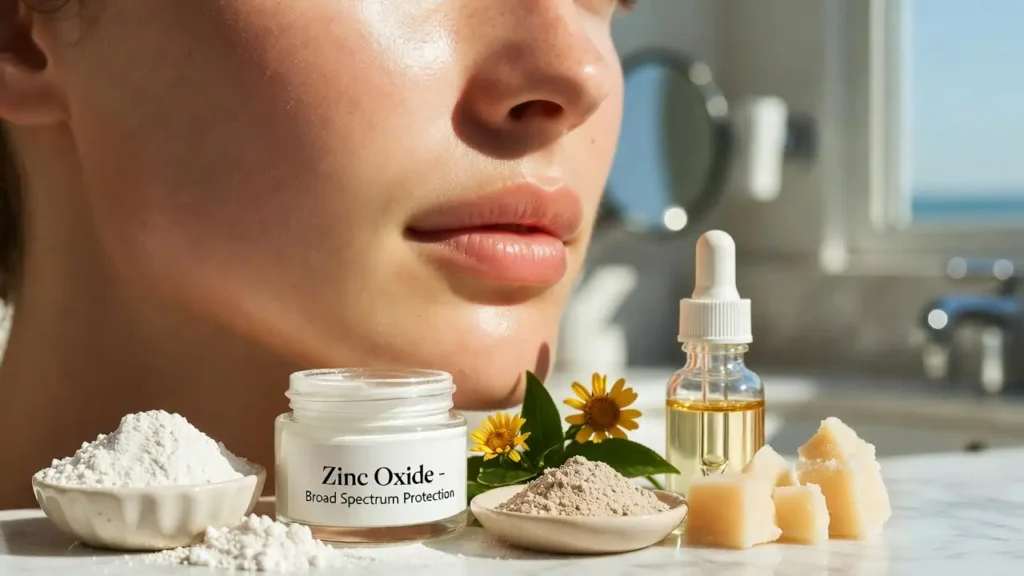
Remember, organic sunscreens with calendula extract or green tea can help calm redness, making them perfect for rosacea-prone users. Always prioritize broad-spectrum testing to ensure UVA/UVB defense!
Sunscreens: Zinc Oxide vs. Titanium Dioxide
| Ingredient | Best For | Texture |
| Zinc Oxide | Full broad-spectrum UV | Thicker, ideal for the face |
| Titanium Dioxide | UVB + partial UVA | Lightweight, less white |
How to Choose the Right SPF: 30 or 50?
Deciding between SPF 30 and 50 depends on your daily routine and skin needs. SPF 30 blocks 97% of UVB rays, making it great for daily use, like indoor work or short walks.
SPF 50 protects against 98% of UVB rays, making it better for outdoor activities like hiking or beach days. If you sweat often, try water-resistant options.
But higher SPF doesn’t mean you skip reapplying! Aim every 2 hours, especially if you’re swimming or using a towel.
For combination skin, hybrid formulas strike a balance between coverage and comfort. To avoid irritation, always check for non-comedogenic labels and dermatologist-recommended seals.
Remember, SPF 30 is sufficient for most days, but SPF 50 provides an added layer of protection for intense sun exposure. Pick based on your lifestyle and skin type!
SPF 30 Organic Sunscreen
- Blocks 97% of UVB rays.
- Ideal for daily use, indoors, or on cloudy days.
SPF 50 Organic Sunscreen
- Blocks 98% of UVB rays.
- Better for beach days, hiking, or prolonged sun.
Table: SPF Comparison
| SPF | UVB Protection | Use Case |
| 30 | 97% | Office, errands |
| 50 | 98% | Swimming, sports |
Note: No SPF block 100% UV. Reapply every 2 hours!
Top 10 Organic Sunscreens for Sensitive Skin In 2026
Finding gentle sunscreens for sensitive skin is no easy task, but we tested and ranked the best organic sunscreen options for 2026.
These picks utilize zinc oxide or titanium dioxide for broad-spectrum protection, free from irritants such as fragrances and parabens. Whether you need reef-safe, non-comedogenic, or eczema-safe SPF, this list covers you.
From lightweight, hybrid sunscreens for combination skin to travel-size, organic sunscreen sticks, each product is dermatologist-approved and ideal for acne-prone, dry, or rosacea-prone skin.
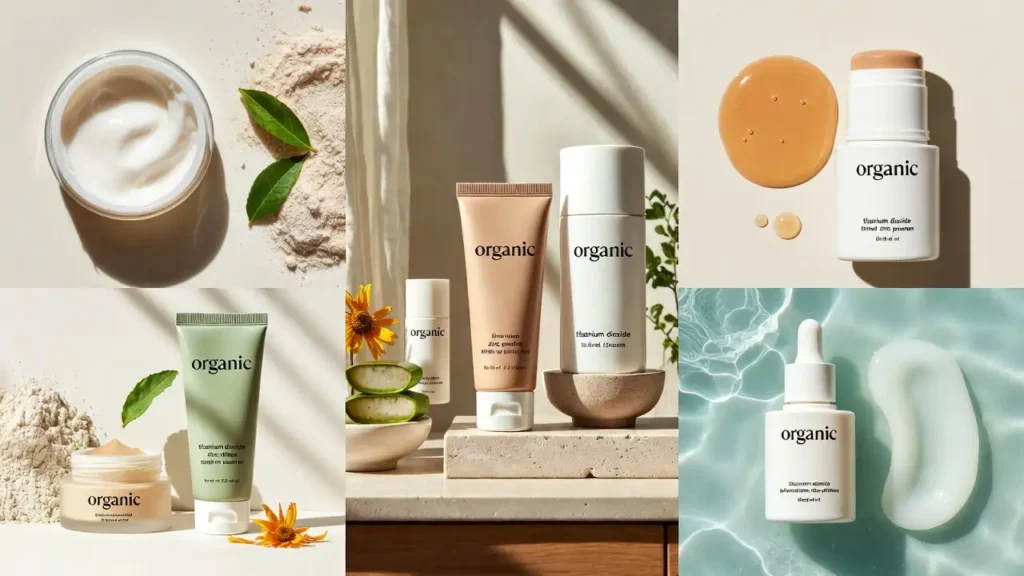
The top 10 options below are hypoallergenic, water-resistant, and free of harsh chemicals, making them both safe and effective.
1. Best Overall: Thrive Reef Safe Sunscreen SPF50
- Non-nano, reef-safe, and ideal for combination skin, this sunscreen is perfect.
2. For Acne-Prone Skin: Ultra Matte Sunscreen Gel with SPF 60 & PA+++
- It contains titanium dioxide to control oil and prevent cystic acne and sunscreen flare-ups.
3. Budget Pick: All Good Sport Mineral Face & Body Sunscreen
- Lightweight, hybrid sunscreen for oily and dry zones.
4. Tinted Option: EltaMD UV Clear Tinted Face Sunscreen
- It has a zero white cast and is ideal for oily skin.
5. Travel-Friendly: Sun Bum Road Tripper | Travel-Sized Sun Care Pack with Sunscreen Lotion, Face Stick, and Lip Balm
- Fits in your purse for water-resistant touch-ups.
6. Eczema-Safe: Eucerin Eczema Relief Body Cream
- Soothing eczema sunscreen flare-ups.
7. Luxury Pick: Green Tea Sunscreen SPF 50 PA ++ with Niacinamide & Hyaluronic Acid
- Fights aging with green tea extract sunscreen.
8. Vegan: Raw Elements Face and Body Mineral Sunscreen SPF 30
- Cruelty-free and reef-safe.
9. For Kids: Babo Botanicals Sensitive Baby Mineral Sunscreen Lotion SPF50
- Gentle enough for pediatric-sensitive skin.
10. For Men: First Aid Beauty – Mineral Sunscreen with Zinc Oxide Broad Spectrum SPF 30
- Non-greasy, mineral sunscreen with no white cast.
How to Apply Sunscreen Correctly
Applying sunscreen correctly is key for sensitive skin. Start by dotting the formula on cheeks, forehead, and chin, then blend outward.
Don’t rub too hard, as friction can irritate rosacea-prone or eczema-prone areas. For the sensitive eye area, use your ring finger to gently pat mineral sunscreen, avoiding tugging.
Pro Tip: Consider using a targeted eye serum for dark circles as part of your overall eye care routine.
Timing matters: Apply 15 minutes before sun exposure to let it bond with the skin. If using water-resistant sunscreen, reapply after swimming or sweating, even if the label says “80-minute” protection.
For touch-ups, a sunscreen stick works great over makeup or during the midday hours. Avoid rubbing—press and roll to prevent streaks.
Pro tip: Ensure you follow a proper nighttime routine.
P.S: Check out our guide to the correct order for your nighttime skincare routine.
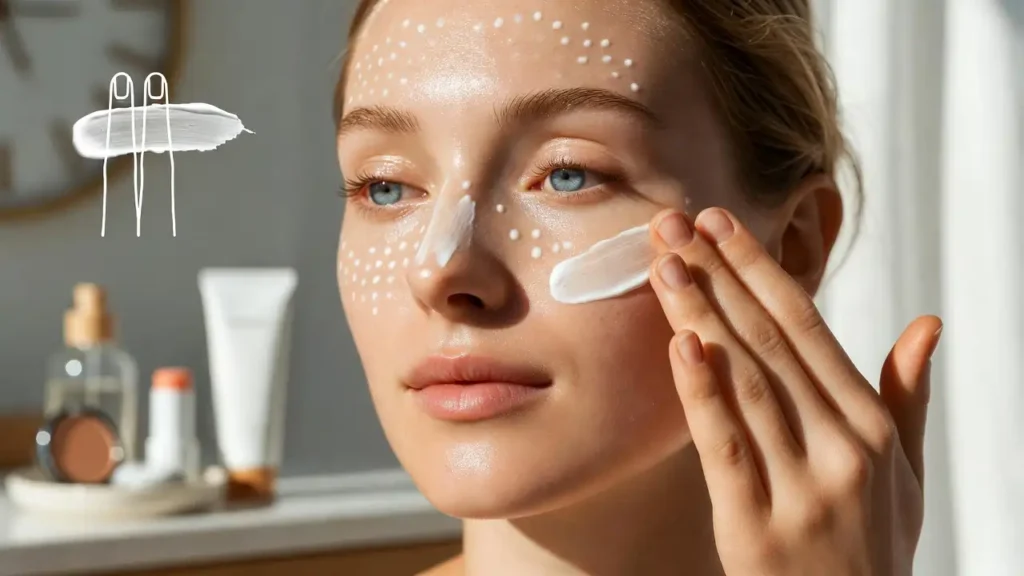
How Much Sunscreen Should You Use on Your Face?
- Use the two-finger rule: Squeeze a sunscreen line across two fingers.
- Don’t forget neck and ears!
Reapplying Over Makeup
1. Blot oil with a tissue.
2. Apply tinted organic sunscreen stick or SPF powder.
3. Avoid rubbing—pat gently to prevent smudging.
Pro Tip: Keep a travel-size organic sunscreen in your car or bag!
Common Mistakes to Avoid When Using Sunscreen
Even with organic sunscreen, many skip key spots like the eyelids and ears, which also need broad-spectrum SPF. These areas are prone to sunburn, especially for sensitive skin.
Another mistake is using expired sunscreen, which loses potency and fails to protect against UV rays. Always check dates and toss old tubes!
For eczema-safe or acne-prone skin, avoid heavy formulas that clog pores or contain alcohol. Instead, pick non-comedogenic options.
Starting with a gentle, organic face wash is crucial to avoid clogged pores.
Lastly, don’t assume higher SPF means longer protection—reapply every 2 hours, whether you use SPF 50 organic sunscreen or a lower rating.
Skipping Sensitive Areas
- Eyelids: Use mineral sunscreen for sensitive eyes.
- Lips: Try *SPF lip balm.
Using Expired Sunscreen
- Check the expiration date! Old sunscreen loses broad-spectrum protection.
Environmental Impacts of Sunscreens: Reef-Safe and Vegan Options
Choosing reef-safe organic sunscreen isn’t just about your skin—it protects ocean life, too. Many sunscreens contain oxybenzone or octinoxate, which bleach coral reefs and harm marine ecosystems.
Opt for non-nano zinc oxide formulas that dissolve safely in water, leaving no toxins behind. This aligns with our broader philosophy of promoting gentle and environmentally conscious skincare.
Vegan options go hand in hand with eco-consciousness. These sunscreens avoid animal-derived ingredients and testing, making them cruelty-free and gentle on sensitive skin.
Pro-Tip: Read our full guide on cruelty-free skincare for all skin types here
By choosing reef-safe and vegan products, you protect your skin and support healthier oceans!
What Makes Sunscreen Reef-Safe?
- Avoid oxybenzone, octinoxate, and nanoparticles.
- Choose reef-safe, organic sunscreen with non-nano zinc oxide.
Best Vegan Picks
Vegan Organic Sunscreen: Cruelty-free and packed with sea buckthorn oil SPF.
Addressing Skin-Specific Concerns of Sunscreens
Not all sunscreens work the same for every skin type—sensitive skin needs tailored solutions. For eczema-prone or dermatitis sunscreen users, avoid irritants like alcohol and opt for hypoallergenic formulas.
Rosacea-prone skin benefits from tinted mineral sunscreens that not only mask redness but also protect it.
If you struggle with acne-prone skin, non-comedogenic options prevent clogged pores and flare-ups.
For comprehensive care, you can consider incorporating elements from a Korean acne skincare routine.
For a more detailed overview, explore our guide’ natural acne treatments,’ tailored especially for teens.
Always check labels for broad-spectrum testing and dermatologist-recommended seals.
Sunscreen for Eczema and Dermatitis
- Look for eczema-safe SPF with colloidal oatmeal.
- Avoid alcohol and fragrances.
Sunscreen for Rosacea
- Pick a tinted mineral sunscreen to reduce the visibility of redness.
Sunscreen for Acne-Prone Skin
- Non-comedogenic formulas like mineral sunscreen for acne-prone skin.
Conclusion: Organic Sunscreen for Sensitive Skin
Choosing organic sunscreen for sensitive skin doesn’t have to be hard—or compromise your comfort. By sticking to mineral filters like zinc oxide and titanium dioxide, you shield your skin from UV damage without triggering redness, breakouts, or irritation. Prioritize reef-safe and vegan options to protect both your complexion and the planet.
Remember: SPF 30 is sufficient for daily use, but always reapply every 2 hours, especially if you’re outdoors or sweating. For eczema, rosacea, or acne-prone skin, opt for hypoallergenic, non-comedogenic formulas with soothing additives like colloidal oatmeal or niacinamide.
Still unsure? Check our dermatologist-recommended picks above for tried-and-tested options. Your skin deserves gentle, effective, and guilt-free protection, so slather on that SPF and step into the sun with confidence!
For more comprehensive anti-aging skincare advice, check out our ultimate anti-aging skincare guide
Check out our list of recommended sunscreens, and share your favorite organic sunscreens in the comments.
FAQs: Best Organic Sunscreens For Sensitive Skin
Is Organic Sunscreen Better For Sensitive Skin?
Yes, organic sunscreen is generally better for sensitive skin because it uses mineral filters like zinc oxide and titanium dioxide, which sit on the skin’s surface without being absorbed. These gentle ingredients minimize irritation, redness, and allergic reactions compared to chemical sunscreens. They also avoid parabens, fragrances, and synthetic preservatives common in non-organic formulas.
Can Sunscreen Prevent Aging?
Yes, daily broad-spectrum sunscreen can prevent up to 90% of visible aging by blocking UVA rays, which break down collagen and elastin. Consistent use reduces wrinkles, fine lines, age spots, and sagging skin. It also lowers skin cancer risk. Choose SPF 30+ mineral formulas with antioxidants for enhanced protection and long-term youthful appearance.
How Does Organic Sunscreen Work?
Organic sunscreen works by using mineral filters (zinc oxide or titanium dioxide) that reflect and scatter UV rays away from the skin, acting as a physical shield. Unlike chemical sunscreens, which absorb UV radiation and convert it to heat, mineral formulas sit on the surface, providing immediate protection without penetrating the skin or causing irritation.
What Spf Should I Use Daily?
Use SPF 30 or higher for daily protection. SPF 30 blocks 97% of UVB rays, while SPF 50 blocks 98%. For extended outdoor exposure, SPF 50+ is recommended. Choose broad-spectrum formulas that protect against both UVA and UVB. Reapply every 2 hours for maximum effectiveness and to prevent sunburn, aging, and hyperpigmentation.
Where To Buy Organic Sunscreen?
Buy organic sunscreen from trusted retailers like Amazon, Target, or specialty sites such as The Honest Company, Badger, and Thinkbaby. Many brands offer direct online stores with subscription discounts. Check for certifications like EWG Verified or USDA Organic. Local health stores and pharmacies also carry reliable options for sensitive skin.
Is Mineral Sunscreen Better For Eczema?
Yes, mineral sunscreen is better for eczema because it avoids chemical filters that can trigger flare-ups. Zinc oxide and titanium dioxide are soothing and anti-inflammatory. Look for fragrance-free, hypoallergenic formulas. These gentle sunscreens protect without irritation and support the compromised skin barrier common in eczema.
Can I Use Sunscreen On Oily Skin?
Yes, sunscreen is essential for oily skin. Choose lightweight, matte-finish, non-comedogenic formulas with silica or niacinamide. These controls shine while protecting against UV damage. Mineral options with zinc oxide absorb excess oil without clogging pores. Apply as the final step in your morning routine.
Does Natural Sunscreen Work?
Yes, natural sunscreen works when it contains active mineral filters like zinc oxide or titanium dioxide. These provide broad-spectrum protection against UVA and UVB rays. Effective natural formulas are reef-safe and gentle. Always check for SPF 30+ rating and broad-spectrum label to ensure adequate protection against sunburn and aging.
How To Avoid White Cast?
Avoid white cast by choosing micronized or nano zinc oxide formulas that blend transparently. Tinted mineral sunscreens better match skin tones. Apply in thin layers and blend thoroughly. Newer formulations with advanced particle technology minimize residue. Test several brands to find the one that disappears completely on your skin.
Can Sunscreen Help Rosacea?
Yes, sunscreen helps rosacea by preventing UV-triggered flare-ups, redness, and inflammation. Mineral formulas with zinc oxide are particularly soothing. Broad-spectrum SPF 30+ protects sensitive skin without irritation. Apply daily to reduce visible blood vessels and maintain a calmer skin tone.
What Is The Best Natural Sunscreen For Sensitive Skin?
The best natural sunscreen for sensitive skin is Badger Clear Zinc SPF 40, which uses non-nano zinc oxide for gentle, broad-spectrum protection. It is fragrance-free, reef-safe, and dermatologist-recommended. Its moisturizing base prevents dryness while effectively blocking UV rays.
Which Brand Of Sunscreen Is Best For Sensitive Skin?
Aveeno and La Roche-Posay are top brands for sensitive skin. Aveeno uses natural oat extracts for soothing, while La Roche-Posay offers thermal spring water-based formulas. Both offer hypoallergenic, fragrance-free mineral options clinically tested for irritation-prone skin.
Which Is The Best Non-Toxic Sunscreen?
The best non-toxic sunscreen is Badger Balm SPF 30, made with non-nano zinc oxide, organic oils, and no synthetic chemicals. It is EWG Verified, reef-safe, and provides broad-spectrum protection. Ideal for the whole family, it offers clean, effective sun defense without harmful ingredients.
📋 Medical Disclaimer
For Educational Purposes Only: This article is written by Kousar Subhan, a Medical Writer and Researcher, and is intended for informational and educational purposes only. The content provided is based on scientific research, peer-reviewed studies, and dermatological literature available as of December 2025.
Not Medical Advice: The information in this article does not constitute medical advice, diagnosis, or treatment recommendations. It should not be used as a substitute for professional medical consultation, diagnosis, or treatment from a board-certified dermatologist or qualified healthcare provider.
Individual Results May Vary: Skin conditions, including hyperpigmentation, melasma, and UV-induced pigmentation, vary significantly between individuals based on genetics, skin type, hormonal factors, and environmental exposure.
Consult Your Healthcare Provider: Before starting any new skincare regimen, especially if you are pregnant, breastfeeding, have diagnosed skin conditions, are taking medications, have sensitive skin, or are undergoing dermatological treatments.
Product Safety: Always perform a patch test before using new skincare products. Discontinue use and consult a healthcare professional if you experience irritation or adverse reactions.

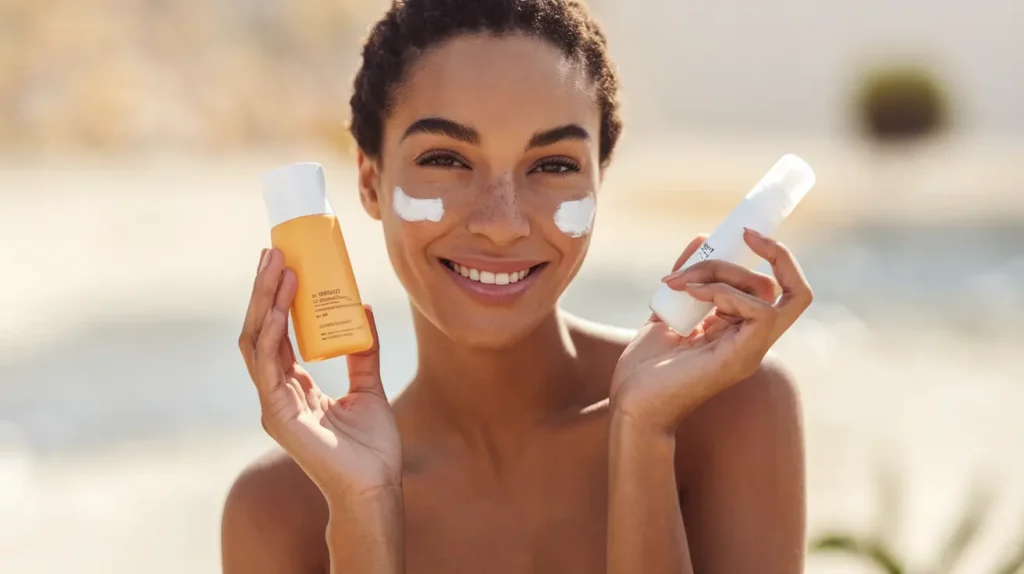
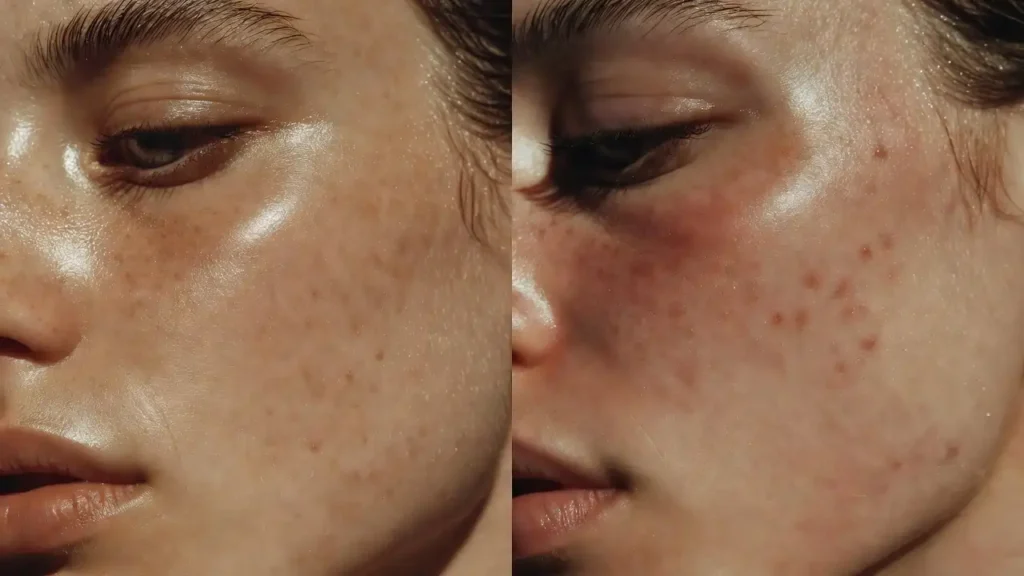
That’s really an awesome post about use of sunscreen. Really appreciate and recommend to be read & further referred.